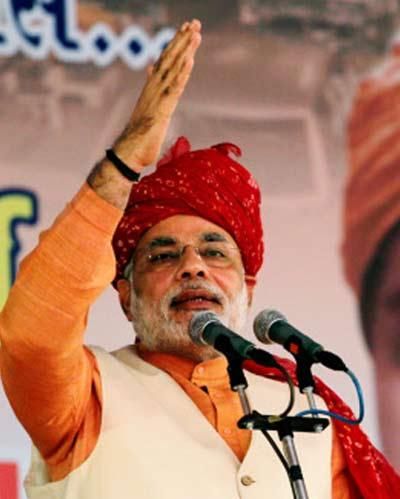
Ahmedabad, October 2: At a rally in Gujarat today, Chief Minister Narendra Modi said that the Centre has spent 1880 crores on foreign trips made by Sonia Gandhi, the Congress president.
The Gujarat Congress chief Arjun Modhwadia retaliated by saying that Mr Modi should get a Nobel Prize for lying. And the RTI activist whose information was cited by Mr Modi has also refuted the Chief Minister's conclusion.
"He should apologise for false and baseless statement," Congress spokesperson Manish Tewari said.
"I do not know where he got this information from. As far as Narendra Modi is concerned, vitriol and untruth come naturally to him. This is his mindset. As the Gujarat election is approaching, he feels the groundswell of support (is) in our favour, and he his losing his sense of balance," Union HRD Minister Kapil Sibal said.
At his rally, two days before Mrs Gandhi's scheduled visit to Gujarat, the chief minister said, "To those Congress friends, who are accusing our government of uncontrolled expenditure, I want to ask: is it not true that on the foreign travels of the President of the Congress Party, Sonia Gandhi, in the past three years, Rs 1,880 crore has been spent from the public exchequer."
He added, "This clearly means that more than the total yearly budget of Bhavnagar, Jamnagar, Junagadh and Rajkot Municipal Corporation combined has been spent only on the foreign trips of Sonia Gandhi and on her luxury hotel stays."
Mr Modi cited a report in a local vernacular paper that said the expenditure on Mrs Gandhi's trips had been revealed through a Right to Information applicant based in Haryana. However, the activist, Ramesh Verma, told NDTV that the chief minister has incorrectly attributed the details to him. Mr Verma said that in June, the Central Information Commission, based on his appeal, asked the Prime Minister's Office to reveal expenses on Mrs Gandhi's official tours; however, he said, those documents have still not been shared.
"I never got any information from the RTI. I don't know where Narendra Modi got this information. I did not give any interview and facts to anyone. Nobody has contacted me yet. I think Modi should give clarification on it," Mr Verma said.
Mr Modi has claimed that the Congress is trying to suppress facts by not releasing the information and that if he is proven wrong, he will apologise.
Gujarat votes later this year; Mr Modi is on a pre-election state-wide tour. Mrs Gandhi will launch the Congress campaign in the state by addressing a rally of farmers in Rajkot.





Comments
Add new comment